I Dig Sports
Noh, 17, playing Marathon on sponsor's invite after going from Mon. qualifier to T-6
Published in
Golf
Monday, 08 July 2019 06:21

American teenager Yealimi Noh will get another chance to build on her promising LPGA debut as a professional.
With Noh, 17, making a stirring run into contention at the Thornberry Classic last week, the Marathon Classic announced Saturday that she had accepted a sponsor’s exemption to play in its event this week. Noh ended up tying for sixth on Sunday.
“I'm just overall really happy with how I played and how I finished, too,” No said. “It was my goal to be inside the top 10.”
Noh made it into the Thornberry Creek field as a Monday qualifier. As an LPGA non-member, she wasn’t eligible for the top-10 berth into the Marathon Classic that was available to members not already in the Marathon field. The sponsor’s exemption spared Noh having to go through yet another Monday qualifier.
“I missed like five in a row [before making it into Thornberry Creek], even when there weren’t that many people,” Noh said. “So, I was really disappointed, but I knew my game could do better.”
Noh made a bogey at the last Sunday that cost her about $10,000, but she still took home $63,170 in earnings, which would rank her 104th on the LPGA money list, if she were a member. It’s important because she can earn LPGA status if she finishes the year with tour earnings that are equal or greater to the player who finishes the year 40th in money winnings.
Last year, Chella Choi finished 40th in money winnings with $253,217 in earnings.
Noh, from Concord, Calif., won the U.S. Girls’ Junior, the Junior PGA Championship and Canadian Women’s Amateur in consecutive weeks last year. She turned pro back in January and had been playing mostly mini-tour events while trying to Monday qualify for LPGA and Symetra Tour events.
Tagged under
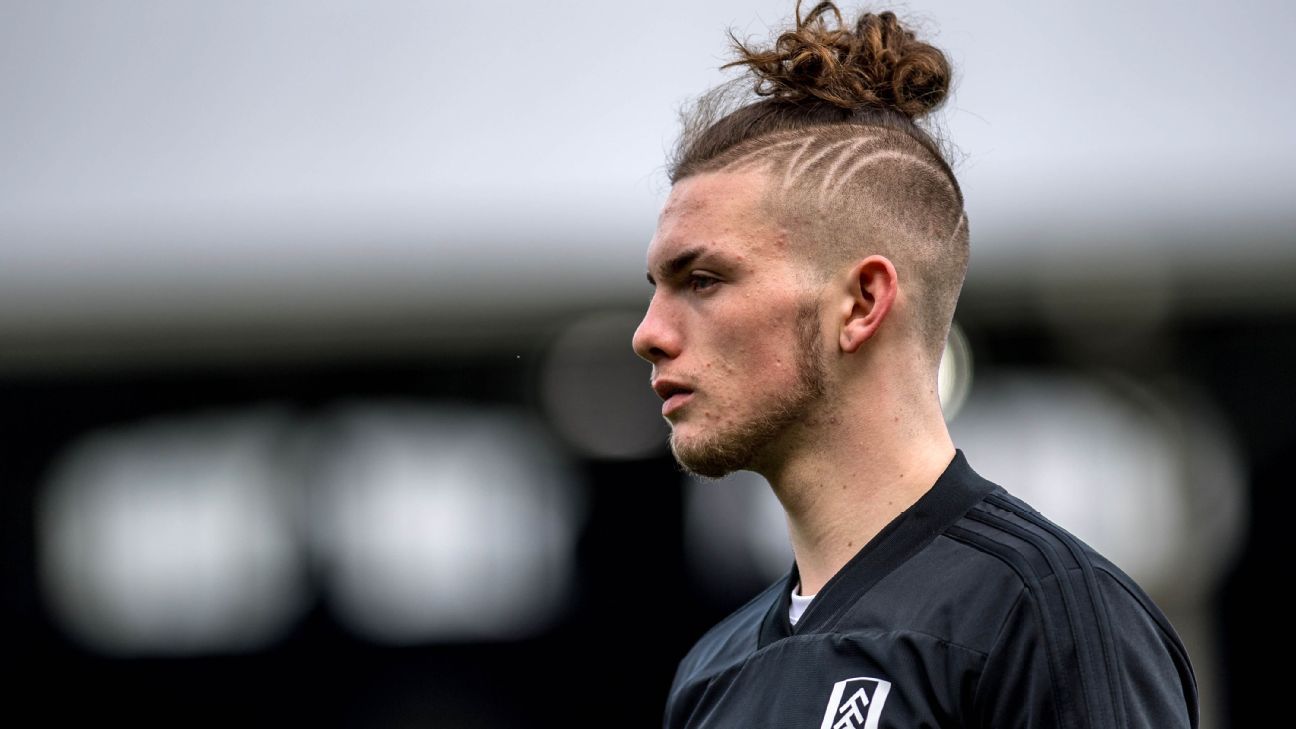
Liverpool have edged out Europe's elite in their bid to sign Fulham's record-breaking midfielder Harvey Elliott, sources have told ESPN FC.
Paris Saint Germain, Real Madrid, Barcelona, Borussia Dortmund and RB Leipzig all had designs on securing the services of the 16-year-old, who became the youngest-ever Premier League player in May.
- Premier League fixtures 2019-20 in full
- Who has qualified for Europe from the Premier League?
- When does the transfer window close?
Manchester City and Chelsea were among the English clubs to scout the teenage sensation, who opted against remaining at Craven Cottage with sources close to the player having said he has decided his future is best served developing with the European champions.
Elliott will not turn professional until his 17th birthday, which is in April, and the maximum length of contract he can sign with Liverpool will be three years.
His schoolboy association with Fulham ended in June and the Cottagers can expect a weighty compensation fee from Liverpool for the England youth international. Elliott became Fulham's youngest player when he made his debut at Millwall in the Carabao Cup last September at 15 years and 174 days old.
He then broke the Premier League record in May 2019 against Wolves, aged 16 years and 30 days -- the first player born in 2003 to feature in the division.
Fulham captain Tom Cairney said at the time: "He doesn't look out of place and does some bits of magic that everyone says 'wow.'
"His attitude and his belief in himself at such a young age is frightening. He's a tricky winger who plays in the hole. He's got a great football brain, an eye for goal and is a very entertaining player."
Elliott represents an extension of Liverpool's commitment to recruiting hugely talented youngsters domestically and from the continent as seen with their signing of Sepp van den Berg.
The Reds will focus on a policy of retention rather than reconstruction this summer, while snapping up young talents for the future.
Tagged under
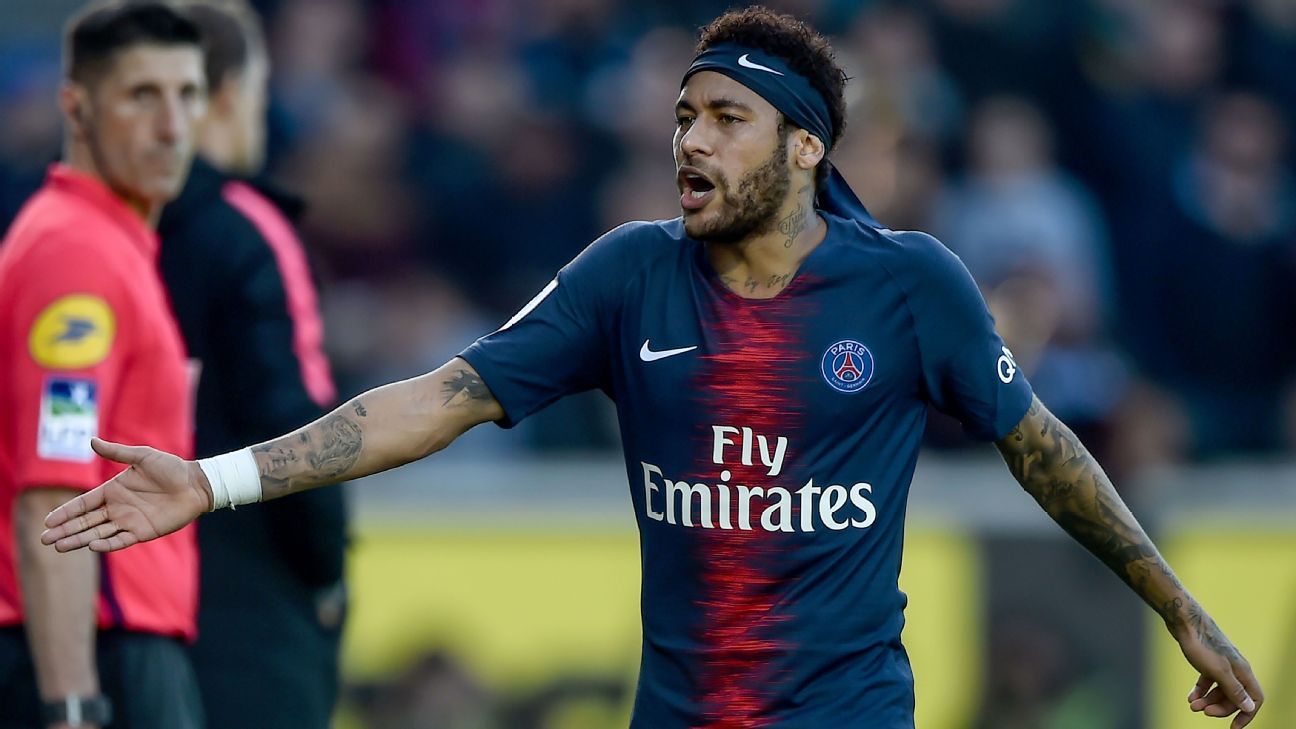
Paris Saint-Germain have issued an official statement condemning Neymar for missing the first day of preseason training amid strong links with a return to Barcelona.
The likes of Kylian Mbappe, Marco Verratti and new signing Ander Herrera were all present on Monday for a number of tests ahead of preparation for the 2019-20 campaign, but the French champions say that Neymar did not report for duty as agreed.
"On Monday 8 July, Neymar was due to return to preseason activities with the PSG senior squad," read the club statement. "PSG notes that Neymar was not in attendance at the agreed time and place."
PSG went on to clarify that Neymar did not have permission to be absent and stated that the Brazil international will be punished.
"This was without the club's prior authorisation," the Ligue 1 giants added. "The club regrets this situation and will therefore take appropriate action."
Neymar's father, who serves as his agent, told Fox Sports Brasil that the club knew that the player would not be able to return to Paris until July 15 due to prior commitments.
Neymar, who has been warned about his commitment by PSG chairman and CEO Nasser Al-Khelaifi, missed Brazil's Copa America success on home soil this summer through injury and was expected to be present in Paris so that his latest fitness issues could be assessed.
Sources have told ESPN FC already this summer that Les Parisiens are open to selling the €222 million man after two incomplete seasons at Parc des Princes, while Barca president Josep Bartomeu has claimed that the La Liga outfit know that Neymar wants to return to Camp Nou.
Also, according to ESPN FC sources, Philippe Coutinho is likely to be added to any potential deal with PSG to take his compatriot back to Spain and Antoine Griezmann's impending arrival would not be an obstacle to Neymar's return.
Tagged under
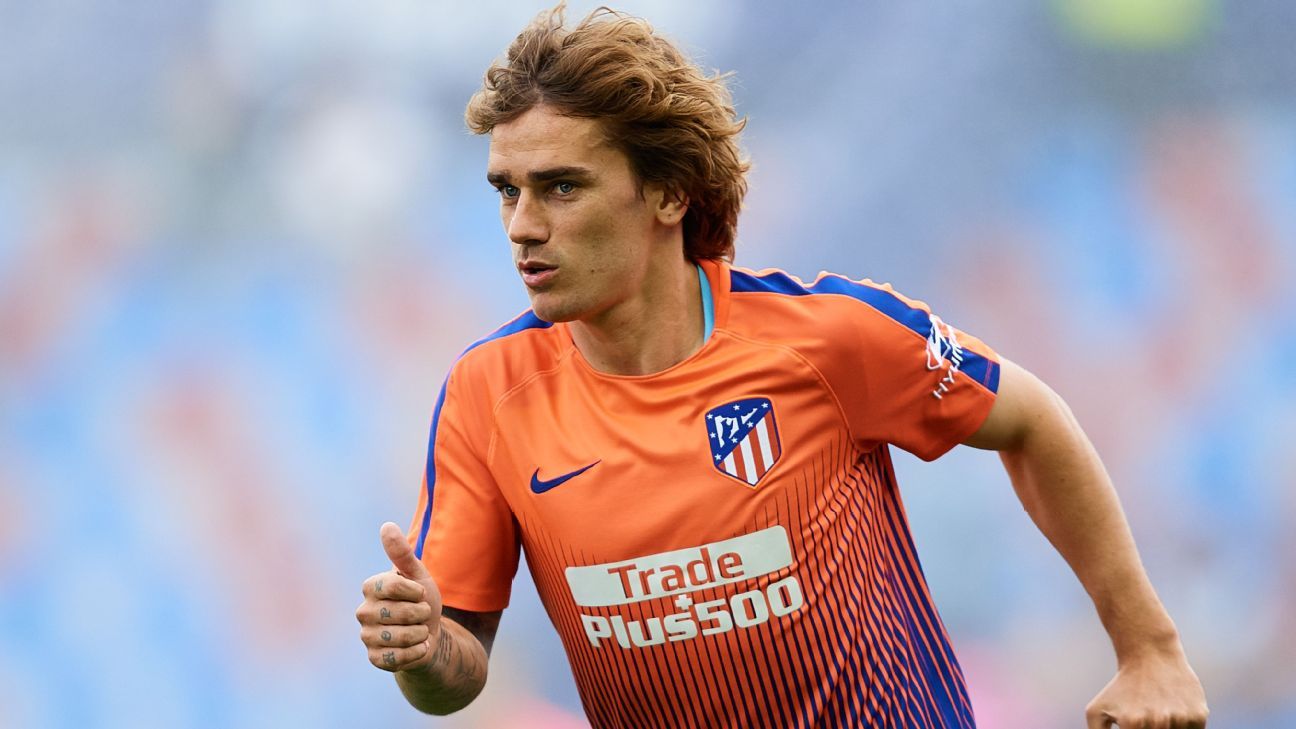
Atletico Madrid have opened disciplinary proceedings against Antoine Griezmann for breach of contract, after the France international refused a request to attend preseason training on Sunday, a source has told ESPN FC.
At the end of last season Griezmann announced he was leaving Wanda Metropolitano and Barcelona were expected to immediately pay the clause when it dropped from €200 million to €120m on July 1.
- When does the 2019-20 La Liga season start?
However, nobody has visited the La Liga offices to deposit the money, and on Friday Atletico rejected a request from Barcelona to pay the transfer fee in instalments instead.
Atletico publicly called on Griezmann to join up with his teammates on Sunday to travel to their Los Angeles de San Rafael preseason base in the mountains above the Spanish capital. But the 28-year-old did not appear and upset club officials at Wanda Metropolitano are now set to fine the player the maximum allowed under his contract, which is around €200,000.
"Logically a disciplinary process will be opened as Griezmann did not present himself for an official call-up with the club where he is under contract," the Atletico source told ESPN FC on Monday.
Griezmann is not legally obliged to join at this time, given he is allowed 30 days off in the summer and his last competitive match was on June 11 for France.
Camp Nou sources have told ESPN FC they remain sure the transfer will go through this week. However, the Atletico source said their side were holding firm and not planning on entering into any negotiations with Barcelona over payment terms.
Atletico's anger at Barcelona and Griezmann entering into talks over a move as far back as last July could also bring further complications -- with Rojiblancos president Enrique Cerezo having said last week there would be "consequences" should be it come to light the player had signed an agreement with Barca in March.
Atletico have already given Griezmann's No. 7 shirt to their new €126m signing Joao Felix, with the Portugal international due to be presented at the Wanda Metropolitano on Monday.
Tagged under
On a day filled with soccer heroics, U.S. women made biggest statement
Published in
Soccer
Sunday, 07 July 2019 23:05
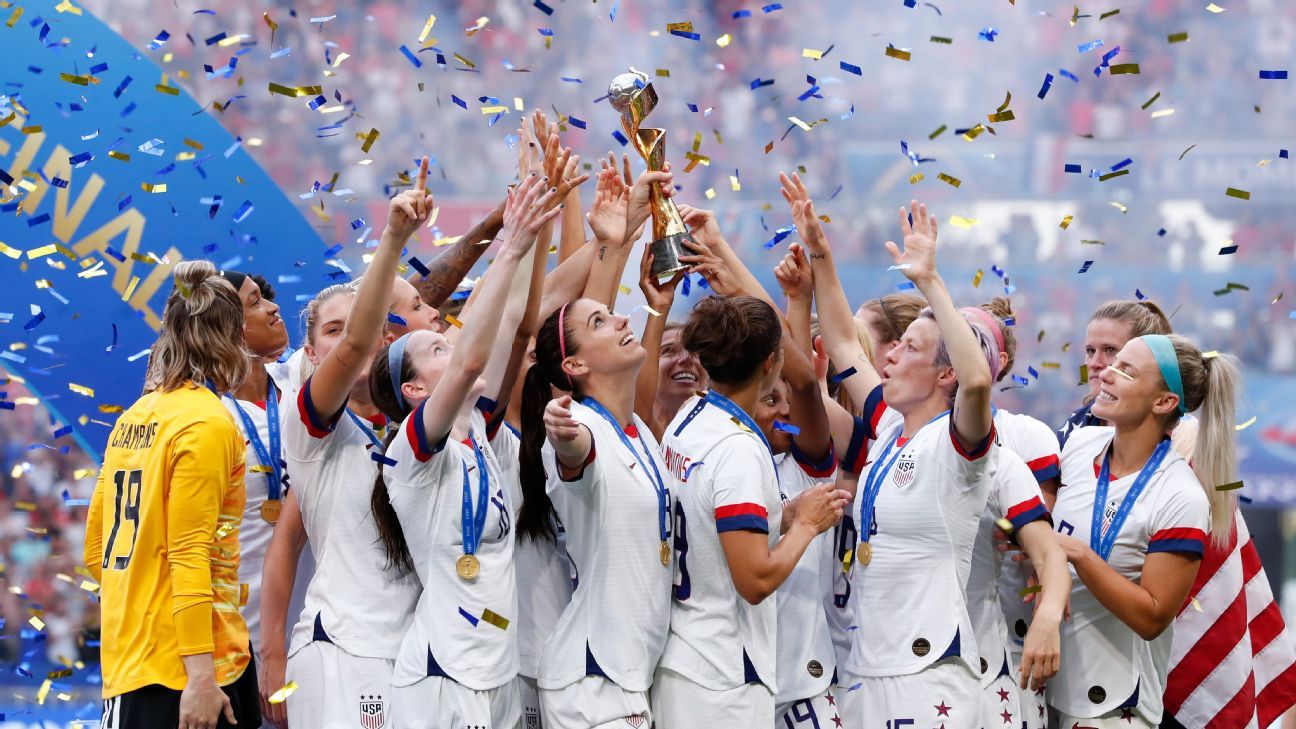
Sunday brought a glorious menagerie of top-tier international soccer to fans around the world, and it was fitting that the victory by the United States in the Women's World Cup final -- the most significant, most meaningful, most important of the day's matches -- came first.
The day later featured a cathartic Copa America triumph for the Brazilian men and a Mexico-U.S. showdown at the Gold Cup, but those two matches failed to reach the impeccable standard that was witnessed at the women's final in Lyon, France.
To what end? For the women, of course, that notion crosses many levels. It is impossible to think of another set of athletes who carry the burden of responsibility that the Americans do, as a group that plays -- every day -- with a social load hanging quite so heavy across their shoulders. They are vocal advocates for the LGBTQ community, for equal pay and for equal treatment.
They played this entire World Cup while suing their own federation for alleged gender bias and -- in a glorious dismissal of the tedious trope that athletes need to avoid distractions to be successful -- dominated the tournament while dealing with questions about the lawsuit, overwrought (and gender-tinged) dissections of their celebrations and a public back-and-forth with the president of the United States along the way.
Their 2-0 victory over the Netherlands in the final was thorough. Megan Rapinoe, whose candor and poise made her the face and voice of the tournament, scored one goal, and Rose Lavelle, the most intriguing young player at the event, scored the other.
Before the game, the Dutch team posted a video to their social media accounts acknowledging that the U.S. team's excellence and ambition the past two decades showed their players that "dreams are possible." Several hours later, the game ended with fans in the stadium chanting "Equal pay!" in the same style as "U-S-A!"
"I feel like this team is in the midst of changing the world around us, as we live," Rapinoe told reporters afterward.
The rise of women's soccer is happening feverishly. The United States was in the quarterfinals with seven European countries (including the Netherlands, who were playing in just their second Women's World Cup); they faced the hungry teams they often inspire. Then they won their second straight World Cup and fourth overall, demonstrating that there is still a significant gap in talent.
In truth, it should have been the only game on the day. There would never be anything even close to a match as big as a Copa America or Gold Cup final scheduled on the same day as the men's World Cup title decider, so it was the height of hypocrisy that FIFA and CONCACAF and CONMEBOL scheduled the women's final to share the stage with anyone. That it was, at least in the case of the Gold Cup, an (admitted) oversight as opposed to willful disregard is, frankly, just as bad.
1:50
Foudy: This is the best team to wear a USWNT uniform
ESPN FC's Julie Foudy and Kate Markgraf explain why this group of World Cup champions is the best to ever step on the field for the United States.
Nonetheless, the men's tournaments -- especially the Copa America -- provided plenty of familiar ingredients: refereeing controversies, hand-wringing over the failures of Lionel Messi and Argentina, and the surge of Peru through the bracket, pushing its way to the final in a quest for its first title since 1975. As upstarts go, the Peruvians and Paolo Guerrero were excellent. But in the end, the tournament was about Brazil, the hosts who -- like the American women -- compete against history every time they step on the field. In this instance, under the embattled coach Tite and without injured star Neymar, they restored order to South American soccer with a 3-1 win.
It was not beautiful. It was not, certainly, the almost-mythical jogo bonito that some Brazilians wax poetic about to the point of delusion. But it was defining and definitive, a reminder of one of those things we always think should be true (even if it isn't always the case): Brazil is one of the best. Now, for the first time since 2007, they are champions of their part of the world.
Mexico can say the same. Yes, the Gold Cup had its version of the Netherlands and Peru -- Haiti's run to the semifinal might be the most staggering thing we see all year -- but, as with the others on Sunday, the story here was affirmation. No team other than Mexico or the United States has won a Gold Cup since 2000, and after halting Haiti, the Mexicans outlasted the U.S. team 1-0 on Sunday in Chicago to make it clear, again, that they are the dominant presence in CONCACAF.
0:43
Brazil crowned Copa America champions for 9th time
To watch the 2019 Copa America, sign up for ESPN+
Again, it wasn't nearly as aesthetically pleasing as the American women's team performance. The pace was frantic but sloppy, and the hateful, vile, anti-gay chant so often shouted by Mexican fans rang out loudly and frequently from the stands at Soldier Field.
Carlisle: Mexico delivers harsh lesson to USMNT
Marhsall: Mexico's 'other' Dos Santos haunts U.S.
There was plenty of ugliness on the field, too, as Mexico's captain, Andres Guardado, should have been (but wasn't) sent off for grabbing his counterpart, Weston McKennie, by the throat. In the end, the U.S. was incredibly wasteful, and Jonathan dos Santos' goal -- which was, in fact, the cap to a gorgeous move -- was the difference. Mexico celebrated a Gold Cup trophy for the eighth time, meaning the team has won more than half of the tournaments played, a reality that felt particularly relevant at the end of this unusual day.
Would it have been a lovely bookend if the United States had won? Yes. But it wouldn't have kept with the weekend's theme of dominance and power. The proof is right in front of us: In soccer, Mexico has it. Brazil too.
And no one has it more than the American women.
Tagged under
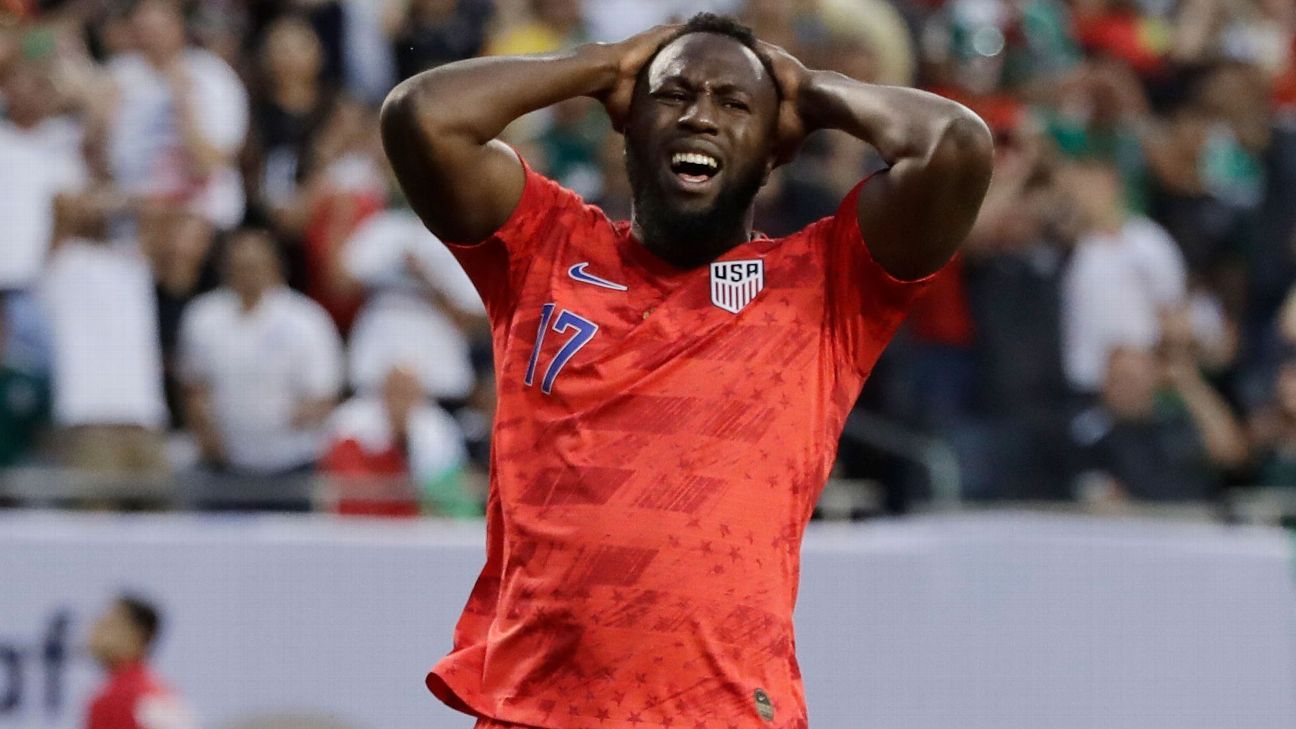
CHICAGO -- Throughout this Gold Cup, United States manager Gregg Berhalter spoke of nothing less than winning the tournament. Given the strength of Mexico's side -- even one shorn of players such as Tecatito Corona, Chicharito Hernandez, Carlos Vela and Miguel Layun -- the odds of that happening seemed long.
So the Gold Cup was always going to be about more than winning. It was going to be about gaining experience for the younger elements of the U.S. squad, as well as a manager new to the international game. It was also about absorbing tough lessons, and boy did the ones delivered in Sunday's 1-0 Gold Cup final loss to Mexico hurt.
- Marshall: Mexico's 'other' Dos Santos haunts U.S.
- Mexico ratings: Pizarro leads way for El Tri
- U.S. ratings: Bradley, Morris too slow for hosts
- CONCACAF Gold Cup: All you need to know
One of the lessons is as old as the game itself: A team playing a more talented opponent simply has to take its chances, and the Americans didn't, especially early in the match. Both Christian Pulisic and Jozy Altidore failed to convert clear breakaways in the first 10 minutes, with Mexico keeper Guillermo Ochoa saving Pulisic's effort and Altidore failing to put his attempt on target. Paul Arriola darted through and beat Ochoa to a ball in the 31st minute, but could only roll his tight-angled effort wide. Jordan Morris had a header cleared off the line by Andres Guardado in the 51st minute.
It was at that point that the game turned irrevocably, and it was time for the U.S. to be handed some different lessons, most notably in terms of game management, both on the field and on the sideline. Berhalter never did have an answer for the tactical adjustments made by Mexico counterpart Tata Martino, in particular Martino's moving of Rodolfo Pizarro to the right flank where he could run at Tim Ream, a center-back attempting to play left-back.
Pizarro had already been a huge presence in the first half, teeing up Andres Guardado for a 16th-minute chance. Pizarro's influence only increased in the second half, and the same was true of his teammates. Mexico's grip on the game tightened. The U.S. proved incapable of keeping the ball. And after pounding on the door -- with multiple shots going right at U.S. keeper Zack Steffen -- Mexico finally carved out a goal of quality. Of course it was Pizarro in the middle of it, and his pass to Raul Jimenez was back-heeled to Jonathan dos Santos whose bending shot beat Steffen in the U.S. goal.
So just how did the game get away from the U.S.? The assessments varied.
"It became a very vertical game, and it opened up a lot of space," Berhalter said postmatch about the second half. "We needed to avoid that by being able to keep [the] ball, being able to move the ball side to side, moving more horizontally rather than vertically.
"We were rushing attacks in the second half, much too direct, and it cost us energy."
Berhalter added, "I think what we lacked was I think some of the confidence, some of the composure. We knew it was going to be a big event, we knew it was going to be a semi-hostile crowd. And I think what I'd say is the confidence is what we lacked. Mexico certainly had it."
Both Bradley and Altidore spoke of how the U.S. struggled to find the first pass when it regained possession.
"We've got a young team, and I think there's moments of growth there," Altidore said about the second half. "I think if you look at that 10-15 minute period, we lost the game a bit. We were trying to play out of the back and stick to our guns and try to get up the field a bit, get in their half and try to change the momentum a bit."
The team's inexperience in some parts of the field was evident as well, and was especially true for Weston McKennie. The Schalke midfielder was handed the captain's armband, a surprising move given the presence of more experienced players such as Altidore and Michael Bradley. Whether it was the armband or the strength of the opponent, the occasion proved to be too heavy for McKennie. His passing was labored, and he lost dos Santos on Mexico's goal.
Berhalter's attempts to combat the game's change in fortune were mixed. Bringing on Cristian Roldan for the struggling Morris in the 62nd minute made some sense. Gyasi Zardes coming in for Altidore two minutes later, not so much. Both substitutions conveyed a message of being defensive in posture and playing to get to extra time.
The introduction of Daniel Lovitz for Tim Ream was a head-scratcher given that Tyler Boyd was available, though Berhalter explained himself in his postmatch news conference.
"When we brought on Cristian, the idea was to help us keep possession," he said. "It was to help us overload the center of the field. I thought we had a difficult time in the center of the field tonight. We felt like he was going to give us the help that we needed centrally, and I think he did well.
"With Gyasi, it was a case of legs, just getting fresh legs. It's very hard to press Mexico if you don't have the stamina, if you're not ready to spring really hard. Jozy put in good shift. We were using him a lot, and I think he did a good job. But we needed some legs there.
"In Daniel's case, at the end of the game we wanted width, we wanted to move our wingers inside and get some crosses into the penalty box. We were willing to risk more staying with a two-and-one on the back line, getting our fullbacks high, tucking our wingers inside and trying to create pressure that way."
Berhalter's moves regarding Altidore remain perplexing. The drop-off in play by the U.S. in each of the last two matches when Altidore departed was clear. At the least, Altidore could be counted on to occupy the opposition center-backs better than Zardes. Altidore was at a loss to explain it as well. Speaking to English-language media for the first time in weeks, he insisted that he felt fine when he was subbed out.
"I felt really good, I felt strong. I felt like I was affecting the game," the U.S. forward said.
When asked about how his minutes were managed in the tournament -- he was the first player subbed in each of the last two games, and prior to that saw Zardes start most of the matches -- Altidore said, "I don't know. I felt good, or else I don't think I'd be here."
The extent to which the U.S. can parley the experience of Sunday's final, as well as the whole tournament, into continued growth is the big question going forward. Certainly the team looked more cohesive as the tournament went on. And while McKennie struggled in the final, and Pulisic's finishing touch went missing on the night, it should be noted that both players showed progress over the last several weeks. The same was true of a back line that conceded just two goals in the entire tournament.
"We have a quality team, and we believe in a lot of the young players," said Berhalter. "We think that at the end of the day, we need to gain experience. A game like this is perfect for us. It was a big occasion, a lot of the players' first time playing in a game like this, and we need to learn. We weren't ready for the step tonight but we will be ready."
The U.S. is still the beneficiary of lowered expectations as well as mediocre competition in the tournament. Given how many players Mexico was missing, it's clear that a significant gap between the two sides remains. But the U.S. needed to start this cycle somewhere. Reaching the Gold Cup final isn't a bad first step.
Tagged under
'Winning three out of seven is almost 50%' - Sri Lanka chief selector on World Cup campaign
Published in
Cricket
Monday, 08 July 2019 09:25
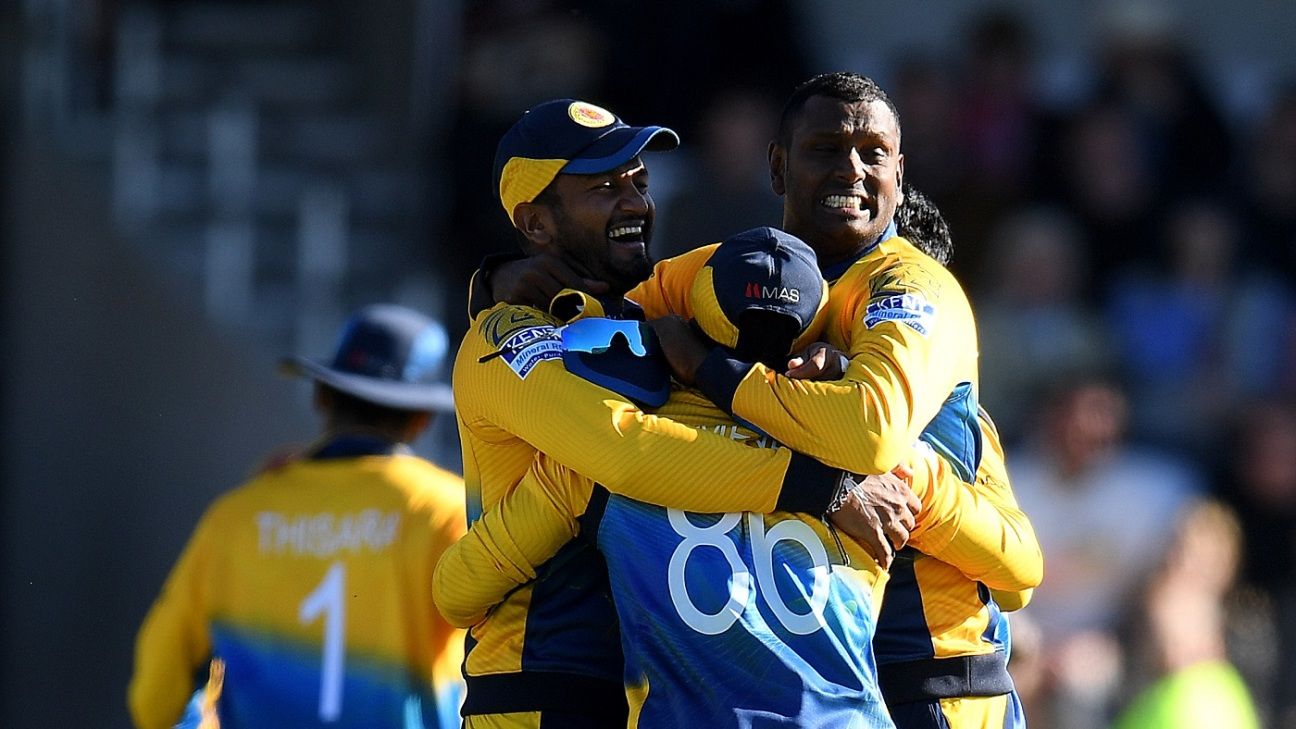
The talent is there, Sri Lanka are just missing the application. The players need to show more mental toughness in pressure situations. Sri Lanka must ensure there's better depth of talent going forward, and give their players the confidence to play a fearless brand of cricket...
Sri Lanka's chief selector Ashantha de Mel rolled out familiar themes without being specific, as the team returned home from the World Cup.
Addressing a packed press room at the Sri Lanka Cricket headquarters, de Mel put a positive spin on Sri Lanka's campaign.
"Scotland is a very good, up and coming side. In fact they had beaten England and Pakistan [Pakistan have never played an ODI v Scotland] in Scotland, so in their conditions they're a very competitive side. So it was nice to see that we managed to score in excess of 330 [322] runs against them," de Mel said, referencing Sri Lanka's two-match series against Scotland just prior to the World Cup.
"Then when the World Cup started we got off to a bad start with New Zealand, but of the seven [completed] games we played we won three. We beat England and West Indies as well. I don't think it was a very successful tour, but I think winning three out of seven is almost 50%.
"And the bowlers, although they were not able to get a lot of wickets, I think they bowled reasonably well. It was just that the batting didn't fire in the first few games to give the bowlers a chance," he continued. "If you watched the [Australia] match you saw that we were 115 for no loss, but ... we allowed Glenn Maxwell to go for just 40 [46] runs. He's their fifth bowler, and I feel we didn't attack him enough. Because when you're chasing 338 [335] you can't allow the fifth bowler to go for 40 runs because then at the end you're going to face Starc and Cummins and trying to score at eight-nine runs an over.
"In this sense the mental attitude of the players needs to change. We must play a Sri Lankan brand of cricket. We must go there and back our talents. We must play positive cricket."
In terms of how Sri Lanka can reach these stated goals, de Mel said they already have a very good core group of players, but that long-term planning is crucial for their talents to bear fruit.
"We have two goals. One is to plan for the next World Cup, the other is to plan for the immediate future and the next couple of games.
"When you look at our present batch of players, Dimuth [Karunaratne] can play another World Cup, Avishka Fernando, Kusal Janith [Perera], Kusal Mendis, even [Lahiru] Thirimanne, I think they can play. Angelo Mathews, if he stays fit, he can also play another World Cup. So I don't see too many problems in the age make-up of this squad.
"I personally feel that the batting, one to six, there's some stability. Maybe we may bring in one or two people, such as [Niroshan] Dickwella who is in form, or Shehan Jayasuriya who is also in the runs. But other than that, I think the top six, we're quite set and we want to build around that. From the fast bowling side we've had some injuries, but with them now recovering and coming back into the fold, we might be able to add some of those guys too. Spinners also we'll have to look and see, because guys like Akila [Dananjaya] and [Lakshan] Sandakan are knocking on the door."
"But at the same time, we expect to bring in more young players into the squad. What we have to ensure is that there is good competition among the first team players and the fringe players. What we've told the players is to go and play without fear, without worrying about your position for the next game."
Captain Karunaratne and head coach Chandika Hathurusingha were also at the press briefing. While Karunaratne's leadership at the World Cup left both Hathurusingha and de Mel impressed, neither captain nor coach is guaranteed to continue in their roles. Hathurusingha is only half way through a well-remunerated 36-month contract, which runs down on December 31, 2020, but his role has remained tenuous of late.
When asked about his future, Hathurusingha said: "I expect to see out the remainder of my contract."
De Mel was initially brought in as head of the selection committee up until the end of the World Cup. At this point it is unclear if he will be asked to continue in the role.
All three are likely to still be in place for Sri Lanka's next two assignments - home series against Bangladesh and New Zealand.
Tagged under
Virat Kohli embraces playing second fiddle in a World Cup of learnings
Published in
Cricket
Monday, 08 July 2019 08:58
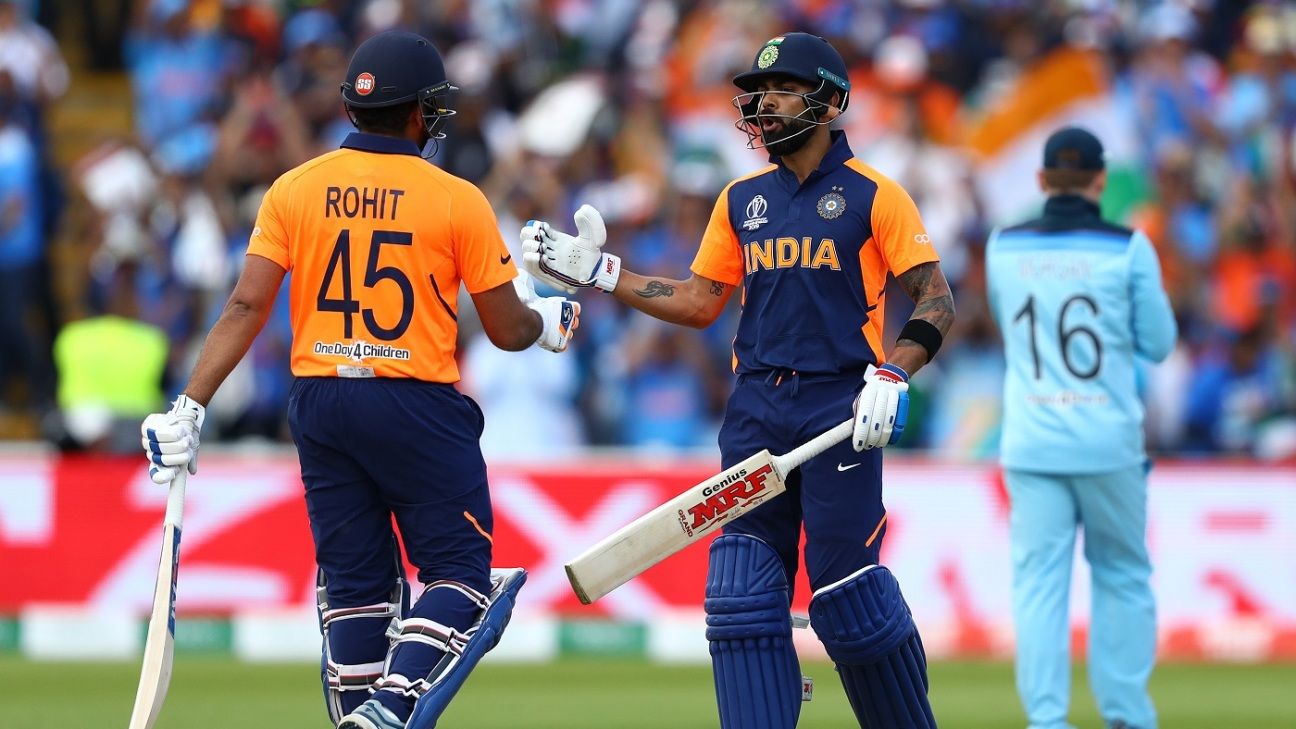
We all know it, but there's no harm repeating it - Virat Kohli has not scored a century in the World Cup. In fact, Kohli has not reached three figures in his last ten ODI innings. The last time he experienced such a barren stretch was in the five-month period between January and July in 2017, when he went without an ODI century for 11 innings.
It is a strange feeling not just for Kohli, but to people around the game in general, as we've all come to expect special things from the man who is just eight short of matching his idol Sachin Tendulkar for the most number of ODI centuries (49) at just 30-years-old.
For now, though, Kohli is grappling with the changed nature of his role in the Indian batting order. Although Kohli continues to be the No. 3, the Indian captain has been batting more with a mindset suited to a No. 4. That change is mainly a consequence of the unsettled middle order. Just under two years ago, MS Dhoni would marshal the middle and lower order, while Kohli went about dominating the opposition in the top order.
But with Dhoni's inconsistency and his domination thinning, Kohli has assumed a role this tournament of directing traffic while going run-a-ball. In fact, the average number of balls Kohli has faced in the tournament - 58 - are the same as in the eight ODIs before the World Cup. However, the time in the middle has shortened.
Another significant factor that has forced Kohli to adopt a different role is the success of the Indian openers, especially Rohit Sharma, who has scored five centuries this World Cup. At the start of the World Cup, the Indian think tank had decided that one batsman among the top three would play as long as possible and drop anchor once he got the start. Rohit has managed to do that a handful of occasions. In fact, in the last two matches, Rohit and KL Rahul have registered 150-plus stands which has given Kohli barely an hour or so at the crease.
Has this made him restless?
"No, not at all. It's been a different kind of role that I've played this World Cup," Kohli said on Monday. The difference, Kohli pointed out, was in helping explosive batsmen like Hardik Pandya and Rishabh Pant gain their footing quickly and allow them the freedom to go after the bowling knowing he was manning one end.
"Coming in the latter half of the innings, you have to play a different role, which is controlling the middle overs and letting guys like Hardik and Kedar, and MS - and in the past few games, Rishabh - come out and express themselves. I have been very happy with holding one end and letting guys express themselves, striking at 150, 160 or 200 if the team needs. And I know I can accelerate in the end."
One has to adapt, Kohli said.
"I have learnt so much in this World Cup, along with spending time in the middle, that, okay, this is also a role that you are supposed to play. It's been nice, it's been a different kind of a challenge to me and I have really enjoyed it - rotating strike and understanding how to play in those middle overs, and allowing the others guys to come out and express."
Kohli reiterated that flexibility is something India have accepted in a long tournament and that has served them well - they lost only one of eight matches in the group stage. And for that reason Kohli said he would not be shy to forsake his No. 3 in case the situation presented itself - where the opening partnership has been a solid one and there is a need for an aggressive batsman like Pandya, who can clear boundaries with ease.
"We have gone along with the pace of the game and that is why we have won the number of games that we have, and we intend to do [keep doing] the same," he said.
"If the situation presents itself where the opening partnership is outstanding and someone needs to go at No 3 and strike the ball, I am absolutely open to do that. To win a tournament like this you need to be very flexible and think on your feet and I think we have done that well so far and hopefully we can do the same thing in two more games."
At every ground this World Cup, Kohli has strode onto the turf so quickly that he is halfway down the pitch even before the outgoing batsman has crossed the ropes. But he has turned that restlessness into intent - one of his favourite words. With that intent, Kohli has managed to calibrate the pace of play nicely in the middle overs.
In the process, he has gladly embraced a role he is unaccustomed to playing: being the second fiddle.
Tagged under
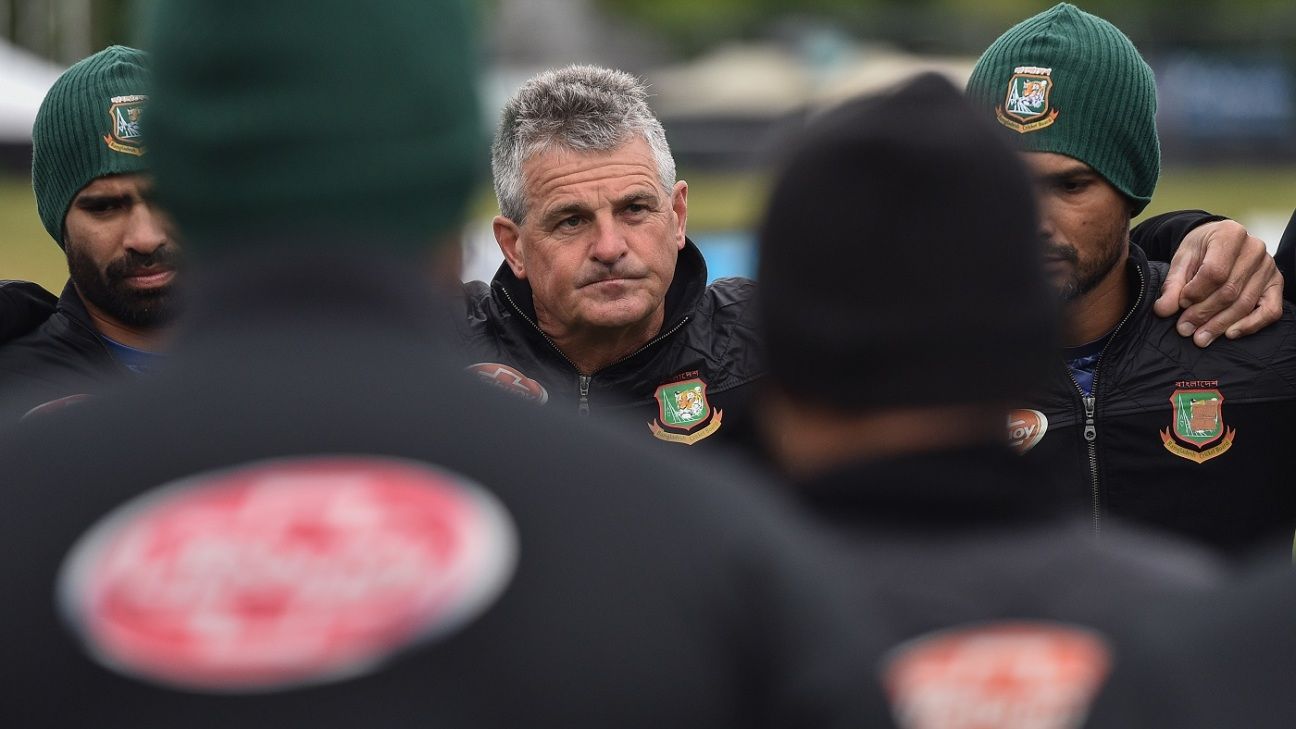
Steve Rhodes' term as Bangladesh's head coach has come to a premature end following the team's eighth-place finish at the World Cup.
Rhodes, who took over in June 2018, was on a two-year contract that was originally set to run until next year's World T20. The BCB and Rhodes have now agreed to terminate the contract by mutual consent.
"The board had a review following the Pakistan match [Bangladesh's last at the World Cup] in a meeting in London," Nizamuddin Chowdhury, the BCB CEO, told ESPNcricinfo. "There it was decided that the BCB and Steve Rhodes will not continue on their agreement. The separation was by mutual consent.
"The BCB has not yet decided on a new coach for the Sri Lanka series, which is their next assignment."
Bangladesh will tour Sri Lanka in late July for a three-match ODI series. They will be without most of the coaching staff who were at the World Cup for it.
Neil McKenzie, the limited-overs batting coach, will be on personal leave during the tour, while the contracts of fast-bowling coach Courtney Walsh, spin-bowling coach Sunil Joshi, and physio Thihan Chandramohan - all of which ended with the World Cup - have not been extended. The only members of the World Cup backroom in Sri Lanka will be fielding coach Ryan Cook and analyst Shrinivas Chandrasekaran.
Walsh, who took over as fast-bowling coach in August 2016, also spent three months as interim head coach, between the time of Chandika Hathurusingha's resignation and Rhodes' appointment.
Bangladesh made an impressive start to their World Cup campaign with wins over South Africa and West Indies keeping them in the hunt for a semi-final spot. Their campaign petered away eventually, though, with only one more win - against Afghanistan - coming from their last four matches.
There was speculation about Rhodes' role - and future - through the course of the tournament, with BCB members saying in informal discussions that he wasn't living up to their expectations.
Tagged under
'We have same opportunity as anyone else' - Kane Williamson
Published in
Cricket
Monday, 08 July 2019 11:13
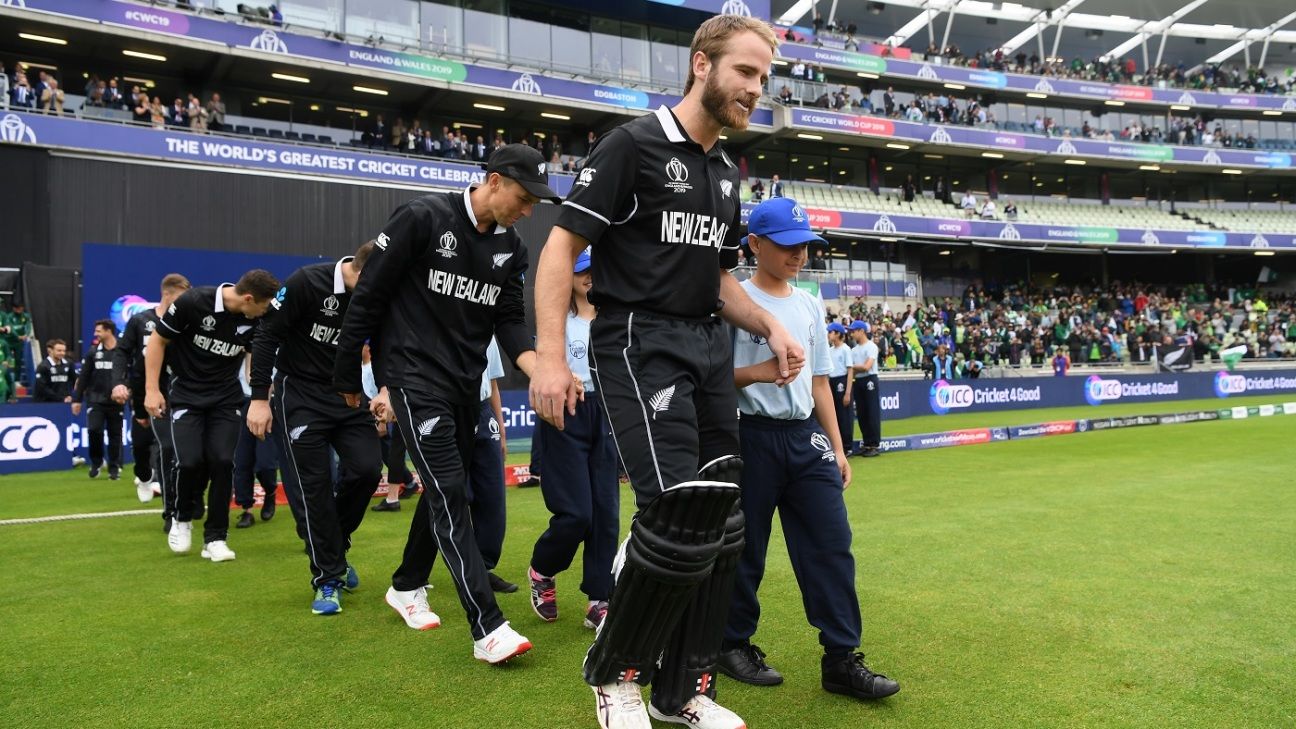
"Just two games." "A fresh start." "It's about how we play on the day."
These are the things Kane Williamson and New Zealand are telling themselves, ahead of their semi-final against India. Of the final four in the World Cup, New Zealand are easily the least-fancied outfit. Not only have they won fewer matches at this tournament than the other three semi-finalists, they have also lost three matches on the trot, going down to Pakistan, Australia and England. Their group stage match against India, meanwhile, was rained out.
And yet, although on paper New Zealand are the most flawed team remaining, knockout cricket can throw up any result. Some swing for Trent Boult, a furious Lockie Ferguson spell, Ross Taylor surging back into his best form - all of these are conceivable. India have substantial flaws themselves.
"I think for everybody it sort of starts fresh tomorrow, after what was a very tough round-robin stage," Williamson said. "Whether we are underdogs or not, it doesn't really matter. It is about how we turn up tomorrow, and look to commit to the plans that we want to implement. We have to go out and play with that freedom because every side has beaten one another on a number of occasions.
"Although we have qualified fourth, we have the same opportunity as anybody else does. There's only two games left in the tournament. During the round-robin we saw that anybody could beat anybody and we saw on a number of occasions that happened. Our focus once again is committing to the style of cricket we want to play that gives us the best chance."
Williamson himself has been the lynch pin in the New Zealand top order more than any other batsman has been for any team, supplying over 30% of the team's runs. Also vital to New Zealand's progress to the semi finals, though, has been the contributions of New Zealand's bowlers. Ferguson and Boult have been especially good, taking 17 and 15 wickets respectively, at averages of 18.58 and 24.66.
James Neesham (11 wickets at 18.18) and Matt Henry (10 wickets at 31.50) have also bowled crucial spells through the course of the of the tournament. Although India go in with more highly-rated attack, New Zealand's isn't far behind, particularly if there is swing to be had at Old Trafford. New Zealand also have a reputation for being an excellent tournament team, because they are adaptable.
"I think the bowlers have been brilliant throughout this whole campaign. We know in cricket that every day is different. Just trying to adapt as a unit as best you can is definitely the most important thing.
"By and large, our bowlers have done that outstandingly well and I think we have seen conditions change considerably from first innings to second innings, on some occasions, so how guys have had to operate in the start of their innings, then move into the second half of the bowling innings, has had to be quite different. By and large, they have been superb throughout."
"But we know we've got a different challenge coming up tomorrow, and that it's a different side, but different conditions again."
Tagged under




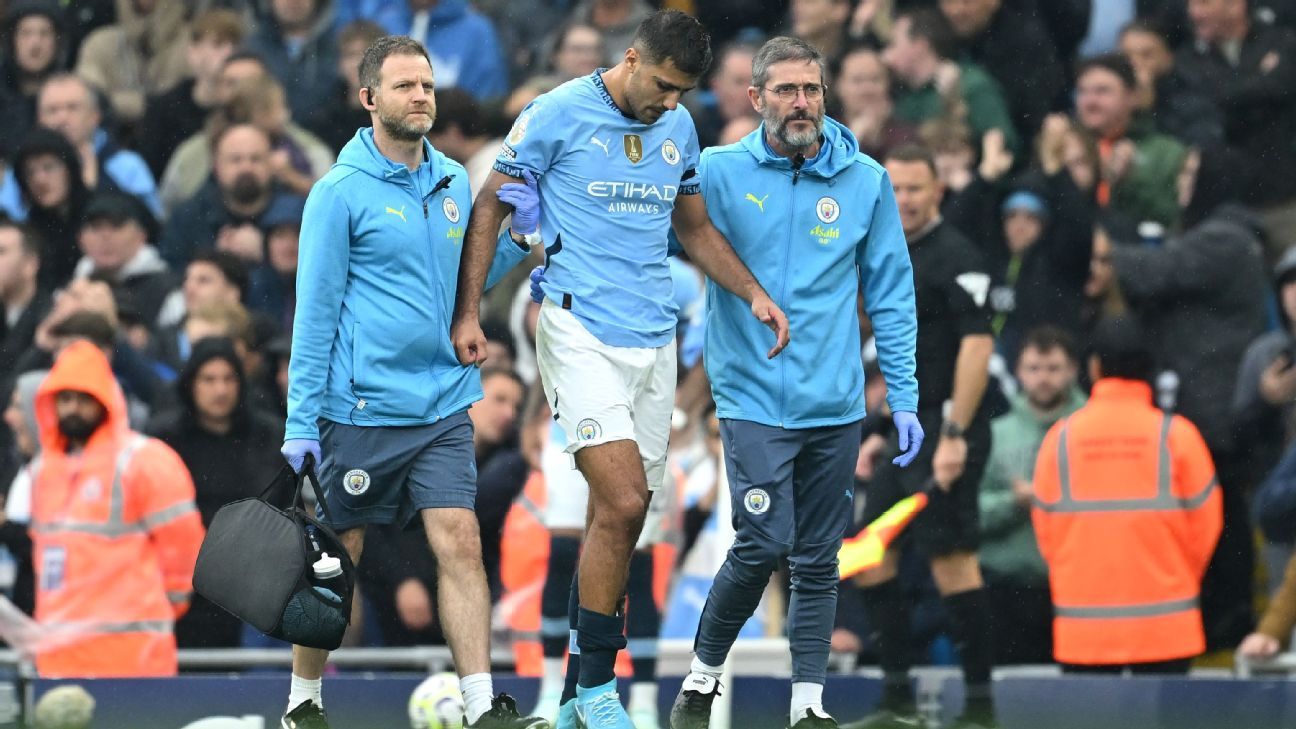










 Phone: (800) 737. 6040
Phone: (800) 737. 6040 Fax: (800) 825 5558
Fax: (800) 825 5558 Website:
Website:  Email:
Email: 






